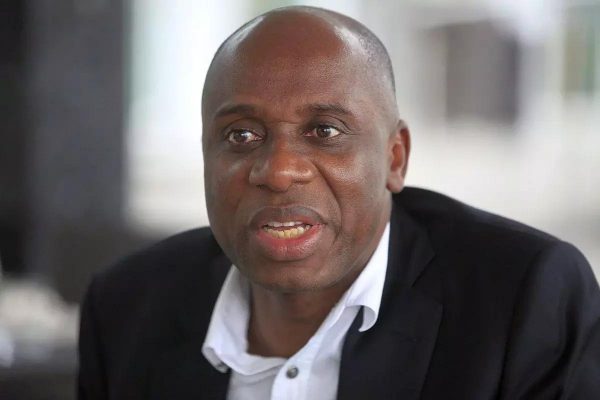The political climate in Nigeria has become increasingly charged in recent weeks, particularly following comments made by former Minister of Transport Rotimi Amaechi concerning the country’s economic struggles. In a recent interview with ABN TV, Amaechi critiqued the subdued public response to Nigeria’s pressing economic issues, such as soaring living costs and fuel prices. He expressed disappointment in the apparent lack of protests or significant public outcry, particularly among the youth, indicating that he had anticipated a more robust reaction to the government’s economic policies. Amaechi’s viewpoint reflects a frustration that resonates with many Nigerians grappling with the consequences of economic turmoil.
In response to Amaechi’s comments, the ruling All Progressives Congress (APC) launched a vehement criticism, labeling his remarks as “irresponsible and unpatriotic.” APC National Publicity Secretary Felix Morka characterized Amaechi’s words as incendiary and indicative of hypocrisy, considering his extensive history within Nigerian politics, which has seen him occupy several high-ranking positions for over two decades. Morka’s statement underscored the party’s view that Amaechi is engaging in “a dangerous game of incitement,” asserting that his rhetoric does not align with the principles expected of someone with his political background, particularly amid efforts to navigate Nigeria through significant economic reforms.
Morka further elucidated the party’s position by asserting that the ongoing economic reforms led by President Bola Ahmed Tinubu are intended to address the challenges that Amaechi highlights. He claimed these reforms are beginning to bear fruit, urging citizens to exercise patience as the administration continues its work to stabilize the economy. The APC’s critique of Amaechi extends beyond mere rhetoric; they also took aim at other prominent opposition figures—like Atiku Abubakar and Peter Obi—implying that their frustrations stem from their political impotence in the current landscape.
Adding weight to their argument, the APC pointed out that the dissatisfaction expressed by Amaechi and his allies appears to be driven more by their desire for power than genuine concern for the populace. The party accused Amaechi and his counterparts of exploiting the citizens’ economic pain for political leverage, fundamentally working against the national interest. Moreover, the APC highlighted a contradiction in Amaechi’s claims about corruption, questioning why he was unable to afford basic necessities like diesel after purportedly enriching himself during his time in power.
Moreover, the APC criticized Amaechi for neglecting ongoing political unrest in Rivers State, which he once governed. They highlighted how, rather than addressing the local crises between current and former governors, Amaechi has seemingly opted to incite discontent on a national level. The party concluded that weaponizing public unrest—despite its legitimacy in certain contexts—for personal political goals is undeniably irresponsible and detrimental to national cohesion. In summation, the APC urged Nigerians to resist the provocations of the opposition and remain steadfast in their support for the government’s reform initiatives.
As the political discourse continues to evolve in Nigeria, the sharp exchanges between the APC and figures like Amaechi underscore the complexities of navigating the nation’s economic challenges. The APC’s commitment to steering the country through its economic recovery appears resolute, though their rhetoric also seeks to frame opposition critiques as politically motivated rather than genuinely representative of public sentiment. Ultimately, the APC calls on citizens to remain patient and supportive of the comprehensive reform strategies, emphasizing optimism as the government works toward meaningful economic transformation.


